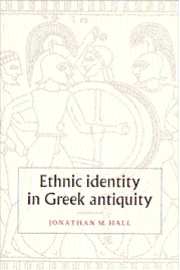Book contents
- Frontmatter
- Contents
- List of figures
- Preface and acknowledgements
- Abbreviations used in the text and bibliography
- 1 Phrasing the problem
- 2 The nature and expression of ethnicity: an anthropological view
- 3 The discursive dimension of ethnic identity
- 4 Ethnography and genealogy: an Argolic case-study
- 5 Ethnicity and archaeology
- 6 Ethnicity and linguistics
- 7 Conclusion
- Chronological table
- Chronological table of authors cited in the text
- Bibliography
- Index
2 - The nature and expression of ethnicity: an anthropological view
Published online by Cambridge University Press: 03 February 2010
- Frontmatter
- Contents
- List of figures
- Preface and acknowledgements
- Abbreviations used in the text and bibliography
- 1 Phrasing the problem
- 2 The nature and expression of ethnicity: an anthropological view
- 3 The discursive dimension of ethnic identity
- 4 Ethnography and genealogy: an Argolic case-study
- 5 Ethnicity and archaeology
- 6 Ethnicity and linguistics
- 7 Conclusion
- Chronological table
- Chronological table of authors cited in the text
- Bibliography
- Index
Summary
The rise and fall of instrumentalism
It is fashionable for Western observers, securely ensconced in their own national identities forged in toil and blood several centuries ago, to pour scorn on the rhetorical excesses and misguided scholarship of nationalist intellectuals in nineteenth-century Europe or twentieth-century Africa and Asia. Those whose identities are rarely questioned and who have never known exile or subjugation of land and culture, have little need to trace their ‘roots’ in order to establish a unique and recognizable identity. Yet theirs is only an implicit and unarticulated form of what elsewhere must be shouted from the roof-tops: ‘We belong, we have a unique identity, we know it by our ancestry and history’ It matters nothing that these are so many ‘myths’ and memories; with them, the English and French are ‘nations’, without them, just so many populations bounded in political space.
It was once thought that ethnicity was a transient phenomenon. This had much to do with the substitution of an ‘instrumentalist’ view of ethnic groups for one that was ‘primordialist’. Put briefly, the primordialists consider ethnicity (along with religion, race and territory) to be a basic and natural unit of history and humanity. Ethnicity is merely an extension of kinship and the normal vehicle through which common goals might be pursued. As an historical ‘given’, it is frequently granted a deterministic role: Max Weber, for instance, regarded ethnicity as having played a decisive part in shaping the patterns and directions of economic forces in ancient Israel, China and India, as well as in the Protestant kingdoms of the Reformation period.
- Type
- Chapter
- Information
- Ethnic Identity in Greek Antiquity , pp. 17 - 33Publisher: Cambridge University PressPrint publication year: 1997



